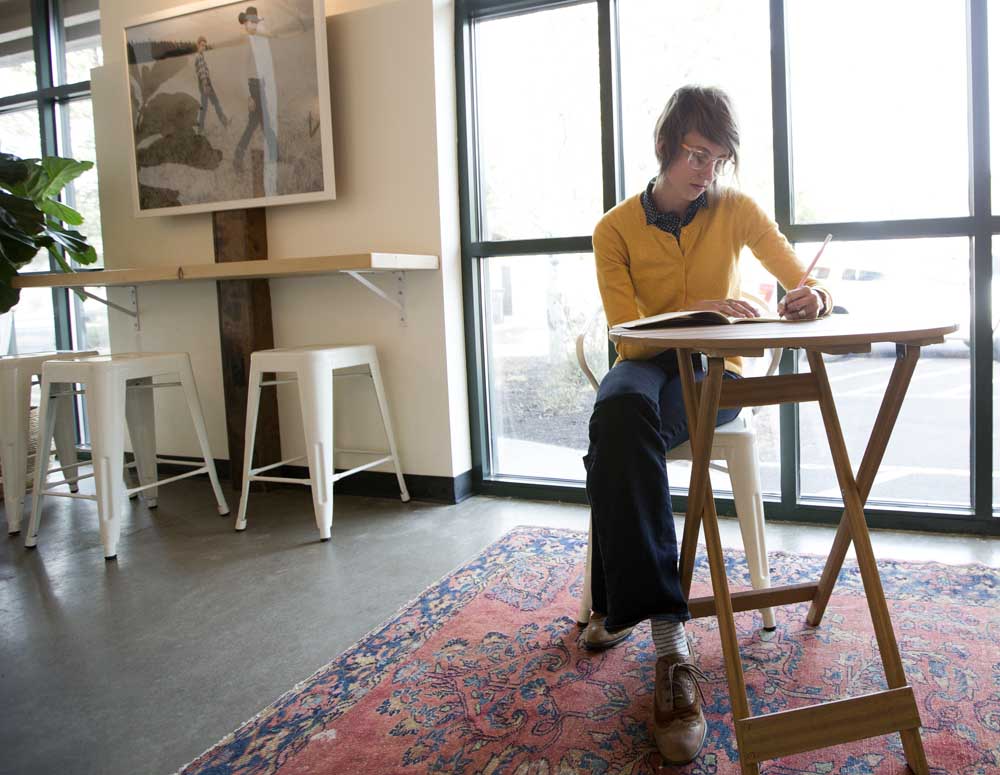Jenna Goldsmith to read experimental poetry in Bend
Published 12:00 am Thursday, April 5, 2018

- Jenna Goldsmith writes poetry in her notebook at Companion Coffeehouse in Bend. (Andy Tullis/Bulletin photo)
Along with the emerging crocuses and daffodils, poetry is in full bloom in April for National Poetry Month. Jenna Goldsmith, a poet and writing instructor at Oregon State University-Cascades, will read a selection of her poems at an event in Bend on Sunday.
She’s excited about the poetry renaissance happening in the U.S. One sign she noticed was that instead of being relegated to a small poetry section in the back of major bookstores, recent poetry collections such as Rupi Kaur’s “milk and honey” and “the sun and her flowers” became best-sellers and earned coveted real estate in the main displays near the entrance.
“Whether it was Barnes & Noble in Kentucky or the store here in Bend, the poetry section always seemed to be by the bathrooms,” said Goldsmith with a laugh. “But if those books are displayed at the front of the store as you walk in, that’s a big deal because we know how much marketing strategy goes into where books are displayed.”
The bathroom metric isn’t Goldsmith’s only measure of the current status of poetry in the U.S. She feels social media and self-publishing have been helpful for poets too, providing a platform for exposure and promotion of many types of poetry, while also creating an important intersection between recent social movements and poetry.
“In many cases, the poets and the activists who are showing up are one and the same,” said Goldsmith. “We’re in a moment where we’re hearing from voices who have really been marginalized such as LGBT poets, black poets and immigrants. I know there are barriers for poets, but right now it feels to me like the walls are as transparent as they ever have been.”
She’s also noticed a resurgence in lyric poetry that is presented with a performance element to add interest and engage audiences.
“It feels like there’s been a shift in who’s writing and who’s performing poetry and what their performances look like, and that’s really exciting,” said Goldsmith.
Some of the current poets on Goldsmith’s reading list are Julia Johnson, Frank X. Walker and Juliana Spahr, and she often rereads the work of Lyn Hejinian and Gertrude Stein, among others.
Although she has been interested in writing since she was a child, it was as an undergraduate at Illinois State University that Goldsmith first began writing more poetry and doing readings. She started out studying journalism, but switched her major to English studies and went on to earn a doctorate in English from the University of Kentucky.
Goldsmith describes her poetry as experimental, with a prose quality and an emphasis on sound. Even if the words don’t always make sense grammatically, she likes to play with word combinations to hear what they sound like.
Goldsmith prefers to draft all her poems by hand. She has notebooks with pages full of script, which surprisingly have very few lines crossed out or corrected.
“I’m much more free that way to just let the work sit there and then get back to it later,” she said. The ideas and poems she thinks are viable, she will then type up and revise.
Goldsmith has been working with procedural poetry for over a decade and has recently become more dedicated to that approach. This technique sets different rules or constructs to help trigger ideas and create a framework to write within. For example she may spend time writing poetry that does not include the letter “e”, or write an ode without being allowed to explicitly invoke the name of the object or person that is the subject. She is currently organizing her accumulated material and planning to release a chapbook.
Goldsmith hopes National Poetry Month will make people commit to reading more poetry and exposing themselves to many different kinds of poetry. She recommends signing up for the Academy of American Poets’ free Poem-a-Day digital poetry series (poets.org/poem-day) that shares a new, previously unpublished poem each weekday and classic poems on weekends.
“My mission in life is, in any way that I can, to promote poetry in some way that’s not too difficult or so abstract that we can’t enjoy it or write it ourselves,” said Goldsmith.








